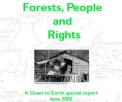Down to Earth No 53-54 August 2002
The following is a summary of recent legal action against companies accused of setting fires in their concessions.
Only 5 of the 176 plantation and timber companies accused of burning to clear concession land in 1997 were ever taken to court and only one was found guilty, according to former environment minister Sonny Keraf, speaking in March 2000.1
A coalition of 13 NGOs and community groups from North Sumatra took legal action against a number of national timber industry associations and thei


